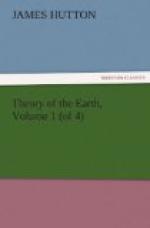PART I.
Theory of the earth;
WITH THE
EXAMINATION
OF
Different opinions on that subject.
IN EIGHT CHAPTERS.
CHAPTER I.
THEORY of the EARTH; or an Investigation of the Laws observable in the Composition, Dissolution, and Restoration, of Land upon the Globe.
SECTION I.
Prospect of the Subject to be treated of.
When we trace the parts of which this terrestrial system is composed, and when we view the general connection of those several parts, the whole presents a machine of a peculiar construction by which it is adapted to a certain end. We perceive a fabric, erected in wisdom, to obtain a purpose worthy of the power that is apparent in the production of it.
We know little of the earth’s internal parts, or of the materials which compose it at any considerable depth below the surface. But upon the surface of this globe, the more inert matter is replenished with plants, and with animal and intellectual beings.
Where so many living creatures are to ply their respective powers, in pursuing the end for which they were intended, we are not to look for nature in a quiescent state; matter itself must be in motion, and the scenes of life a continued or repeated series of agitations and events.
This globe of the earth is a habitable world; and on its fitness for this purpose, our sense of wisdom in its formation must depend. To judge of this point, we must keep in view, not only the end, but the means also by which that end is obtained. These are, the form of the whole, the materials of which it is composed, and the several powers which concur, counteract, or balance one another, in procuring the general result.
The form and constitution of the mass are not more evidently calculated for the purpose of this earth as a habitable world, than are the various substances of which that complicated body is composed. Soft and hard parts variously combine to form a medium consistence, adapted to the use of plants and animals; wet and dry are properly mixed for nutrition, or the support of those growing bodies; and hot and cold produce a temperature or climate no less required than a soil: Insomuch, that there is not any particular, respecting either the qualities of the materials, or the construction of the machine, more obvious to our perception, than are the presence and efficacy of design and intelligence in the power that conducts the work.




